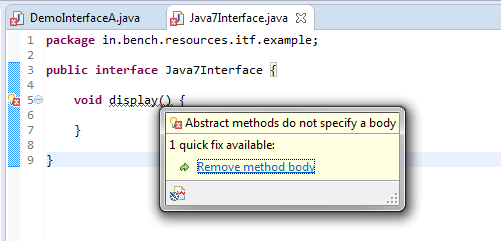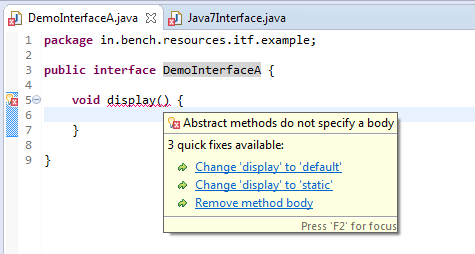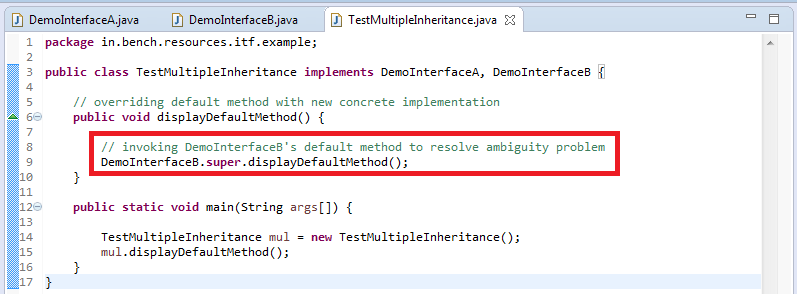Interface in Java Interview Questions: One of Java’s key features is the ability to implement interfaces. An interface is a collection of method signatures that can be implemented by a class. Interfaces provide a way for classes in Java to implement common functionality without the need for inheritance. As such, Java Interface interview questions are an essential part of Java developer interviews.
These interview questions are aimed at assessing a candidate’s understanding of interface implementation in Java, including their advantages, the differences between interfaces and abstract classes, and their practical application in programming. In this context, this article provides some commonly asked Java interface interview questions that can help Java developers prepare for interviews and have a better understanding of implementing interfaces in Java.
Interface Interview Questions In Java
What is Interface in Java? OR Explain Interface in Java?
Till the Java 7 version,
- An interface in Java is a pure abstract class which means all methods are abstract, and variables are constants
- By default, all methods inside an interface are public & abstract, and variables are public, static & final
- An interface is a means to achieve full abstraction in Java
Post-Java 8 release,
- An interface can contain default and static methods in addition to abstract methods
- Though it look too similar to abstract classes, they are actually different in many ways
- Read more about Java 8 default and static methods in Interface in detail
Can we instantiate an interface?
- No, we cannot instantiate an interface
- Since the interface doesn’t have a constructor and contains only abstract methods and constants, therefore, we don’t need to instantiate
- Instead, implementing classes provide concrete implementation for these abstract methods, and constants can be accessed using <interfaceName>.<variableName>
Post-Java 8 release,
- In addition to abstract methods and constants, Java 8 introduced default and static methods
- default methods can be accessed using implementing the class’s reference object
- static methods can be accessed using interface name i.e.; <interfaceName>.<staticMethodName>
- Read more about Java 8 default and static methods in Interface in detail
Can we create an object for an interface?
- No, we cannot create an object of an interface
Q) What happens if we define a concrete method inside the Interface?
Till the Java 7 version,
- A compilation error will be thrown, stating below the reason
- Compile-time error: Abstract methods do not specify a body

Post-Java 8 release,
- Concrete methods (method with the body) are allowed with default or static keyword prefixed, as shown below
- Otherwise, even in Java 8 compilation error will be thrown, as seen below screen capture

Can a method inside an interface be declared as final?
- By default, methods declared inside an interface are public & abstract even if we don’t declare it explicitly compiler adds this modifier during compilation time
- An interface allows only public & abstract modifiers in a method declaration
- If the final keyword is added in the method declaration, then the compiler will throw an error, as seen in the below screen capture
- Compile-time error: Illegal modifier for the interface method display; only public & abstract are permitted

Post-Java 8 release,
- Still, the final modifier is not allowed in any of the methods in the interface i.e.; abstract, default & static methods
- Compile-time error: Illegal modifier for the interface method display; only public, abstract, default, static, and strictfp are permitted

What happens if we don’t initialize variables inside the Interface?
- The compiler throws an error stating final variable needs to be initialized
- As variables defined inside an interface are by default public, static & final. So, the final variable always needs to be initialized where it is declared
- Compile-time error: The blank final field <fieldname> may not have been initialized

- There has been no change even after the post-Java 8 release
Can we declare members as private or protected modifiers inside the Interface?
- Variables (members) defined inside an interface are, by default, public, static & final
- Therefore, no other access modifier allowed except for public
- During the compilation process, the compiler inserts/adds a public, static & final keyword for variables
- These are interface variables and are accessed using the interface name
- For example, <interfaceName>.<memberName> from any other class
- There is no change even post-Java 8 release too
How can we access variables defined inside the Interface?
- Members defined inside the interface can be accessed using the interface name from any other class
- For example, <interfaceName>.<memberName> from any other class
- There is no change even post-Java 8 release too
Can we modify variables defined inside the Interface?
- Since variables defined inside the interface are final, therefore we cannot change the value of these variables anywhere (simple OOPS concept)
- If we try to change the value, the compiler throws an error
- Compile-time error: The final field <interfaceName>.<fieldName> cannot be assigned
- There is no change even post-Java 8 release too
Can we re-assign a value to an interface field?
- Re-assigning fields throws a compile-time error as these are final by default
- Compile-time error: The final field <interfaceName>.<fieldName> cannot be assigned
What modifiers are allowed for methods in an interface?
- Till the Java 7 version, only public & abstract are permitted
- Post-Java 8 release, only public, abstract, default, static, and strictfp are permitted
Is it ok to add an “abstract” keyword to the interface definition?
- Yes, we can actually add an abstract keyword to the interface definition (somewhat similar to abstract classes)

Whether class compiles successfully if we don’t implement any of the abstract methods from Interface?
- No, the compilation error will be thrown
- If a class implements an interface, then it must provide a definition or concrete implementation for every abstract method
Post-Java 8 release,
- Still, implementing class must provide a definition or concrete implementation for every abstract method in an interface
- Exceptional being default and static methods; it is okay if we don’t override the default method
- Read more about Java 8 default and static methods in Interface in detail
What is the best possible solution if we don’t want to implement a few of the abstract methods from Interface?
- The best solution is to declare the implementing class as abstract; compilation will succeed
- However, the next inheriting class (i.e., extending this class) must provide a concrete method implementation or declare it again as abstract.
Can we reduce the visibility of the methods while implementing an interface?
- By default, abstract methods declared inside an interface are public
- As per the overriding rule, access visibility of the methods can be widened further
- So, it must declare overriding methods as public; as no other access visibility is wider than the public
- Read more about Java overriding rules here
Can we declare a constructor inside the interface?
- A compilation error will be thrown stating, “Interfaces cannot have constructors”
- Compile-time error: Interfaces cannot have constructors

Can an interface be final?
- No, an interface cannot be final, and a compilation error will be thrown
- Compile-time error: Illegal modifier for the interface <interfaceName>; only public and abstract are permitted

Can the interface extend any class?
- No, an interface cannot extend any class
- An interface can only extend one or more other interfaces
Can an interface implement any other interface?
- No, an interface cannot implement another interface
- An interface can only extend one or more other interfaces
Can an Interface extend another interface?
- Yes, an interface can extend one or more interfaces
What is a marker interface or tagged Interface?
- An interface with no fields or methods is known as a marker interface
- A marker interface is used to indicate or provide essential information to the JVM or compiler
- Alternatively, it is referred to as a tagged interface
- java.io.Serializable or java.lang.Cloneable is an example of a marker or tagged interface
- Marker interface improves readability in comparison with any other alternatives
Can an interface contain another interface as a member?
- Yes, an interface can contain another interface
- This is referred to as a Nested interface
What is a Nested Interface in Java?
- An interface declaration contained inside another class or interface is known as a Nested interface
- During compilation, the compiler inserts/add the static keyword to the nested interface
DemoInterfaceA.java
public interface DemoInterfaceA {
String NAME = "Softwaretestingo.com";
// Nested interface inside another interface
interface NextedItfExample {
}
In this article, we will cover some of the interview questions with their justification for the Java 8 interface. These are the most frequently asked interview questions from OOPS concepts
Java 8 Interface Interview Questions
What are the default methods in Java 8?
- With the release of Java 8, a new cool feature is added i.e.; if any new method needs to be added, then provide the default implementation for this new method inside the interface itself
- This new method will be prefixed with the “default” keyword and known as a default method
- In Java 8, default methods are alternatively referred to as Virtual Extension methods or defender methods
- Example of the default method
InterfaceInJava8.java
// only public and abstract are permitted
public interface InterfaceInJava8
{
// old abstract method
void displayAbstractMethod(); // by default, this is public and abstract
// default method with concrete implementation from Java 8
default void displayDefaultMethod()
{
System.out.println("InterfaceInJava8 : default method impl inside interface");
}
}
- No, for defining the default method inside the interface, the “default” keyword is a must, and it should prefix the method declaration
- Without prefixing the default keyword results in a compilation error
- Compile-time error: Abstract methods do not specify a body
- Reason: without a default keyword, the compiler considers it as an abstract method, and as said, abstract methods don’t have a body
Are multiple inheritances possible, i.e., implementing 2 or more interfaces?
- Java allows multiple inheritances through interfaces i.e.; a class can implement 2 or more interfaces
- Post-Java 8 release,
- With the introduction of default methods, the ambiguity problem might arise when both interfaces have the same method with exactly the same signature
What happens in multiple inheritances from Java 8?
- In Java 8, a class can implement 2 or more interfaces, and this might cause ambiguity problems with the introduction default method inside the interface
- Ambiguity problem arises because; both interfaces can have the same method with exactly the same signature
What happens if a class implements 2 interfaces having exactly the same “default” method with the same signature?
- Results in ambiguity problem with a compiler throwing error
- There are 2 interfaces having the same default methods, and a class implements both these interfaces and results in an ambiguity problem
DemoInterfaceA.java

DemoInterfaceB.java

TestMultipleInheritance.java

- Compile-time error: Duplicate default methods named displayDefaultMethod with the parameters () and () are inherited from the types DemoInterfaceB and DemoInterfaceA
How can we resolve the ambiguity problem in Java 8 while implementing multiple Interfaces?
- To resolve the ambiguity problem in Java 8, override the conflicting method
- Now, if we want to invoke the default method from any of the interfaces, then call using the super keyword
- For example, <interfaceName>.super.<defaultMethodName>
How to invoke one of the interface’s default methods while implementing two interfaces?
- Using super keyword
- Syntax: <interfaceName>.super.<defaultMethodName>
How do we overcome multiple inheritance problems in Java 8?
- Override the default method in the implementation class
- Altogether provide new implementation or
- Invoke either one of the default methods using the super keyword
- For example, <interfaceName>.super.<defaultMethodName>
What happens if a class implements 2 interfaces having the exact same method with the same signature (consider one as default and another abstract)?
- Compilation fails with an error saying the conflicting method
- Compile-time error: The default method displayDefaultMethod() inherited from DemoInterfaceA conflicts with another method inherited from DemoInterfaceB
- To overcome this error, override this conflicting method and provide a new implementation or invoke the default method’s implementation using the super keyword
Can we declare the static method inside the interface?
Answer: Yes, we can declare starting from Java 8
Is it okay to define a static method inside the interface?
Till the Java 7 version,
- Defining any concrete method (method with the body) inside the interface will throw a compilation error, even if it’s a static method
Post-Java 8 release,
- Static methods are allowed to define inside interface
- This is a new feature added in Java 8 which will act as a helper method
How can we access static methods inside the Interface?
- Using interface name
- Syntax: <interfaceName>.<variableName>
What is the interface in Java, and what are its uses?
Ans: The interface in Java is similar to a class, which may contain a method’s signature only but not bodies and it is a formal set of methods and constant declarations that must be defined by the class that implements it. Interfaces are useful for:
- Declaring methods that one or more classes are expected to implement.
- Capturing similarities between unrelated classes without forcing a class relationship.
- Determining an object’s programming interface without revealing the actual body of the class.
Class C implements Interface ‘I’ containing method m1 and m2 declarations. Class C has provided the
implementation for method m2. Can an object of Class C be created?
Ans: No. Class C should implement all the methods in the interface ‘I’. Since Class C didn’t implement the m1 method, it has to be declared abstract. Abstract classes can’t be instantiated.
Can a method inside an interface be declared as final?
Ans: No. Doing so will result in compilation errors. “public” and “abstract” are the only applicable modifiers for the method declaration in an interface.
Can an interface implement another interface?
Ans: Interfaces don’t provide implementation; hence, an interface cannot implement another interface.
Can an Interface extend another interface?
Ans: Yes. An Interface can inherit another Interface or extend more than one Interface.
Can a class extend more than one class?
Ans: No. A class can extend only one class but can implement any number of interfaces.
Can an interface be final?
Ans: No. Doing so will result in a compilation error.
Can a class be defined inside an interface?
Ans: Yes. It’s possible.
Can an interface be defined inside a class?
Ans: Yes. It’s possible.
What is a Marker Interface?
Ans: A marker interface is an interface that doesn’t have any declaration inside but still enforces a mechanism.
Can we define private and protected modifiers for variables in interfaces?
Ans: No. We cannot define private and protected modifiers for variables in interfaces
What is Externalizable?
Ans: Externalizable is an interface that extends the Serializable Interface and sends data into Streams in compressed format. It has two methods, writeExternal(ObjectOuput out) and readExternal(ObjectInput in).
What modifiers are allowed for methods in an interface?
Ans: Only “public” and “abstract” modifiers are allowed for the methods in the interfaces.
When can an object reference be cast to an interface reference?
Ans: When the object implements the referenced interface, an object reference is cast to an interface reference.
What is the difference between an Interface and an Abstract class?
Ans: An abstract class can have instance methods that implement a default behavior. An Interface can only declare constants and instance methods but cannot implement default behavior, and all methods are implicitly abstract.
An interface has all public members and no implementation. An abstract class may have the usual flavors of class members (private, protected, etc.) but has some abstract methods.
Can an anonymous class be declared as implementing an interface and extending a class?
Ans: An anonymous class may implement an interface or extend a superclass but may not be declared to do both.
What is an abstract class?
Ans: An abstract class is deliberately incomplete and designed with implementation gaps for subclasses to fill in.
If you find any missed interview questions, please inform us by commenting in the comment box.
Ref: article


